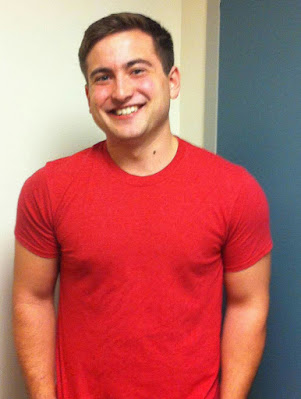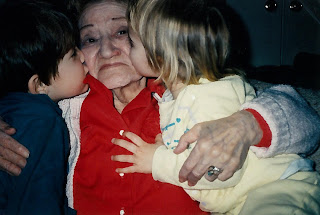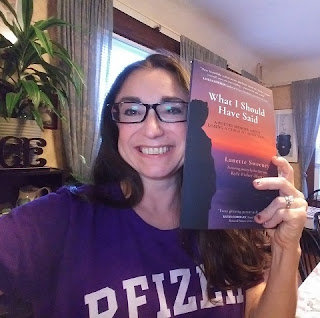dedicated to convincing its members that our children are with us in spirit. Unlike my other bereaved-parent groups, which are careful not to proselytize or push individual beliefs, HPH is unapologetic about proselytizing. The leaders of the group want parents to believe in the afterlife; they attempt to reassure us in our grief by telling us that our children's spirits are always around us. The group leaders encourage us to look for signs, and they often recount the signs they themselves have seen from their own deceased children.
I vacillate between wanting to believe every penny and feather we find is evidence our children exist in spirit to sadly thinking we’re all deluding ourselves.
Last week HPH had a special online meeting with a medium, and while other of their online meetings have drawn maybe a dozen parents, this Zoom had 175 people in attendance. Seeing the number of attendees made me cry, just to see how many parents were desperate for a word from their dead child--and to realize most of us would not be called upon.
I’ve been to other group gatherings with a medium, one at my local library where the guy seemed like a charlatan, and the other at a Theresa Caputo show to which my mother took me; an experience you can read about here. I did not get called on directly in either case. A friend and I who both lost our sons to drug overdoses have talked about hiring a medium to give us a reading, but we have both been too afraid of being disappointed. Still, as I was getting ready to attend this Zoom meeting, I silently begged Kyle to please come through for me.(I talk to my son sometimes because it’s easier to show faith than not when one is not sure what one believes. Maybe he can hear me; maybe not. No one is hurt by me having a conversation with my late son, even if I am only imagining what he'd say back.)
The medium, Becky Hesseltine, was a very sweet young woman; she led us through some deep breathing and then stilled herself and tried to open to a connection with whatever spirit was pushing to come through. Other mediums I have seen, including Caputo, start by shouting out a clue – (e.g., “I’m seeing an older woman whose name starts with an M,” and then they wait for someone in the audience to shout out, “Yes, my mother’s name was Mary.”) But Becky didn’t do that; she called on people individually and told us our loved ones were there, and then she tried to share the spirits’ messages with that loved one. She seemed incredibly genuine. And, touchingly, a little bit nervous. I can only imagine the pressure one feels facing a group of 175 grieving parents, worrying you’ll disappoint them.Becky asked each person she called on to confirm that she was on the right track by saying something like “Yes” or “I understand.” So as she was saying things, her listener was saying, “Yes, I understand that, yes, that makes sense,” adding to the authenticity of the whole event. For the first woman, she said, “I see your mother.” The woman immediately had tears in her eyes and nodded vigorously that she understood. “Your mother is with your son,” Becky told her. It turned out the woman’s mother had died four months earlier and she’d wanted to know if they were together. She was hugely relieved to learn they were. The second woman, who had lost her daughter, was skeptical enough that she didn’t say yes or I understand to many things, even when they were really close. “Are you wearing your daughter’s earrings?” Becky asked the woman. “No.” She said. But it turned out she was wearing her daughter’s rings, which seems pretty close.
Becky only got to call on three of the 175 of us, and to my enormous surprise and relief, mine was the third and final name called. I was in tears of disbelief as soon as I heard my name. Becky started by telling me that a female, a mother figure was there to talk to me, and I responded by shaking my head no. My mother is alive; she must have the wrong person. My heart sank. But then Becky said “Well let’s make sure this person is here for you, ok? This woman died from a cancer in her lower abdomen.” “Oh!” I said, "Oh, yes, my grandmother died of pancreatic cancer." So Becky said, “OK then, she is here for you.” I was in a kind of shock, as I’d never dreamed I would be hearing from my grandmother, who died in 1995.
If you would like to watch a video of the entire reading, it's here. (If you want to skip ahead to my portion, it starts at minute 33.) My daughter Jamie has watched it and is convinced it shows Kyle speaking to me. "That's it, Mom, proof! We know now Kyle exists in spirit. If anyone doubts it, we have it on tape." I wish I felt that certainty.
Becky went on to tell me many things that affirmed she was really talking to my grandmother: “Your grandmother was tough,” Becky said. “She had to really be tough.” This was certainly true, as she’d been dropped off at an orphanage when she was five by a family that couldn’t feed her. “She had to do a lot of things alone from an early age.” Yes, she was widowed young and had to raise my mother byherself.
“She really wants you to know she’s `sharp as a tack’ and `can hear everything,’ This was literally something my grandmother used to tell me and my mother all the time. The phrase “sharp as a tack” was too on the nose not to be clear evidence of my grandmother.
“She shares your pain, she understands you, Becky said. “She has your son there with you and she wants you to know she understands your suffering.”
“Yes,” I answered, weeping. “She lost a son, too.” (This picture from my first wedding is a picture of my grandmother and her son, my Uncle Steve.)
“Yes,” Becky affirmed. “That’s why she understands. She’s always watching out for you.”
Really? This was surprising. I must admit I had never given a thought to whether my grandmother existed in spirit and was watching over me. But perhaps that’s why she was pushing to the front of the line the first time a medium communicated with me. Maybe I've been ignoring her as she tried to talk to me for the past 25 years.
Starting with the specificity of saying my grandmother died of a cancer in her abdomen (how could she know that?), Becky’s reading of my grandmother was just dead on. “She played a lot of roles in your life,” Becky said (Yes, she was like a second mother to me; my mom and I lived with her off and on throughout my childhood; she cared for me whenever I was sick).
Finally, Becky said she was turning her attention to the person she knew I wanted to see, my son, though then interrupted herself to say, “My goodness, your grandmother is powerful.” She said my grandmother was very fierce and demanding and she was having trouble stopping her and tuning in to hear my son, but finally she did.
Sadly, this is where the reading veered off from utterly amazing to more like other readings I’ve seen, filled with what sometimes seemed like guesses, some of which fit and some of which didn’t. Becky started by saying she gathered that my son had died suddenly. Yes. And she eventually asked if it was from substances, from an injection, and I said yes, he'd died of an overdose.
But before that she asked if my son had a disability, something wrong on his right side, like maybe paralysis on his right side, and I said no, nothing like that, though we don't know what might have happened as he died (nor, as Renee wondered, which arm he shot up when he overdosed). Anyway, we let that go, because we didn't know what it meant.
Becky said Kyle had a giant heart , an immense heart, and that he loved his family, and that he loved our family dinners and always had fun at them. He said we had a lot of fun together as a family, that even when we no longer lived together he loved coming home for family dinners. (Which I agreed was true.)
She then said he was saying something about public speaking and she asked me if he had trouble with
public speaking and I laughed and said no, he was a stand-up comedian (see one of his adolescent performances, above), and she said something like, “Oh I have to remember whenever someone tells me something and I think they mean a negative, I have it backward. So he was actually the opposite, extra comfortable with public speaking!” And while this was true, it felt like a reach to go for the “Oh I meant the opposite” answer. Also, perhaps Kyle did have trouble with public speaking; he was quite nervous before every show and had to push himself hard to perform and hadn’t performed in years when he died, so maybe he was trying to say something about that and I missed it altogether. But I didn’t like not feeling an immediate aha over everything Becky said. Why must everything my son says be vague and coded. (Well, ok, because he’s dead, I get it, but I wanted to feel we were having a magical experience, and I didn’t.)
Becky said my son kept parts of himself very private and didn't share them, and I agreed this was true. She said he wanted me to know that he always felt fully accepted by me, that he knew I accepted all the parts of him, even the secret ones that he didn't like to share. Also true. (You can read more about Kyle's secrets here.)
There were other things that weren't right on the nose with what she said about Kyle. For example, she asked if I found his body or if he was home when he died, but I said no, I saw him in his coffin but didn't find his body and he wasn't home when he died. Becky seemed confused and said well, he's home now, he keeps talking about home and says he’s definitely home with you. Only afterward did I realize: of course he is home with me now; his ashes are buried in my backyard under an apple tree we planted in his honor, the remainder are reserved in a bag in my bedroom closet in case his daughter ever wants them. So yes, in a literal sense, he is home with me now and forever.
Becky’s main message was of the love he feels for all of us, how big his heart is, how he wishes he could have been more open with us while he was alive. Becky seemed very genuine. She didn't act like a big fancy mystic; she just seemed natural and down to earth. She called specifically on three of us and gave us each a specific reading about our own people. She stated a lot of facts about all of these people that could not have been guessed or looked up.
I had wondered in the past if mediumship could be explained by ESP. Maybe there are no spirits, but mediums can use psychic abilities to pick out of our heads what we want to hear and say it back to us. But this experience with Becky confirmed for me that mediums do exist who can pick up on some kind of communication from the spirit world, as I had no thoughts of my grandmother that Becky could have picked out of my head; my grandmother's arrival was a complete surprise to me. Still, despite this confirmation, I was left feeling almost as empty and disappointed as before I had the reading, which makes me feel very ungrateful. But I didn't want vague ideas that could apply to many young men. I wanted my son to appear before me in a blazing ring of fire. I want to be able to hug his muscled shoulders. I want to feel his arms around me. Or at the very least I want a message no one but him could give me.
Also, I would not have pictured my son and my grandmother together in the afterlife. They seem so unconnected from one another, as my grandmother barely knew my son; she already had dementia by the time she lived near him when he was a little boy, and his main memory of her was being dragged to the nursing home to see her several times a week, not a fun time for any toddler. This raises questions for me about what brings spirits together out there. Is it just blood connections? (And if so, what does that mean about adopted families?) Why are they hanging out? Why hasn’t my grandmother been reincarnated already? (Or maybe she has and her spirit can divide and speak to me while it’s living in another body here on earth. I’ve been doing a lot of reading about reincarnation, and that seems to be a theory.) But again, I am left with more questions than answers.So despite all this, or maybe because of it, I got my mother to sign us up to take a course together that Becky is offering, “Revealing your Intuition and Spirit Connection.” It starts tonight at 8 p.m. Eastern time and runs for 10 weeks. I’m telling myself this is partly because I think learning about spirituality and meditation will be good for my mother, who has no belief in the afterlife and a fear of death and has never meditated. But really, probably I am just hoping for another chance at a conversation with Kyle.






















